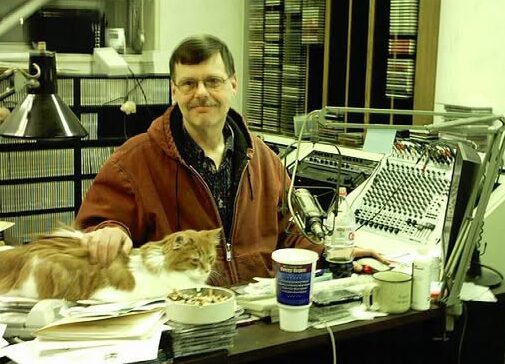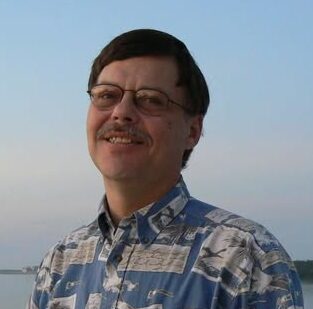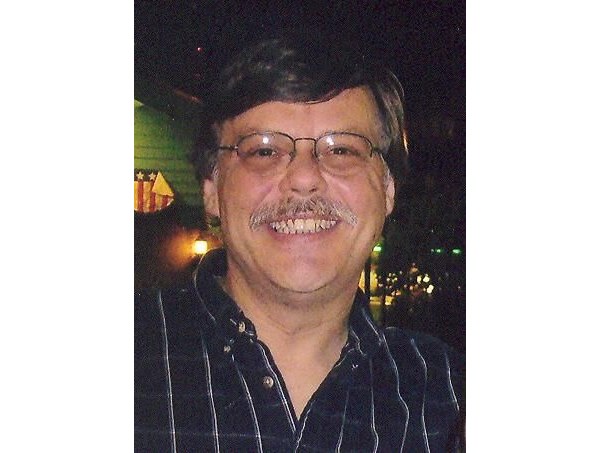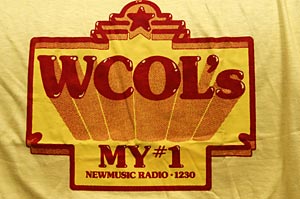The Little Guy with a Big Dream: Chris Larko’s Radio Odyssey

On the gritty south side of Fort Wayne, Indiana, where perseverance was as common as the hum of factory shifts, Christopher “Chris” Larko came of age with scant resources but an unquenchable thirst for the airwaves. Nurtured in a single-parent household by his devoted mother, Roberta Louise (Brodbeck) Larko, following his father’s departure, Chris navigated the challenges of a modest upbringing. Yet, amid the constraints, he discovered a boundless world through radio’s invisible threads. Much like countless aspiring disc jockeys in small and mid-sized towns during the swinging ’60s, groovy ’70s, and electric ’80s, Chris yearned for his moment behind the microphone. For him, though, radio pulsed through his veins—a lifelong devotion matched only by his unwavering allegiance to the Chicago Cubs, whose games he cherished and later broadcast on his own stations.
Roots on the South Side: Forging a Passion
Entering the world on May 30, 1958, Chris transformed adversity into ambition. The south side offered no frills: humble abodes, pinched finances, and a tight-knit neighborhood vibe. With Roberta toiling away to make ends meet, young Chris tuned into radio as his escape and inspiration—the silky spins of DJs, the gripping Cubs play-by-play, the raw energy of rock anthems. At just 15, he leaped from listener to broadcaster, snagging his inaugural on-air role at a local outlet. This plucky adolescent, balancing academics and overnight slots, harbored visions grander than typical teen dreams: commanding his very own radio empire.
His formative days were all about the grind. Chris immersed himself in the craft—cueing vinyl, fine-tuning gear, mastering broadcasting’s intricacies. His zeal bordered on fanaticism; acquaintances remember him toting a weathered radio like a talisman, chasing faint signals under starlit skies, envisioning his broadcasts reaching equally far. Unlike glamour-seeking metropolitan announcers, Chris aimed to construct a legacy, crafting a sonic identity for his community. A die-hard Cubs supporter since boyhood, he revered broadcasters like Jack Brickhouse and Harry Caray, whose narrative flair seeped into his delivery, infusing his shows with that same engaging storytelling.
A Sting of Rejection and the Road to Resilience
By the late 1970s, WMEE reigned supreme in Fort Wayne—an FM juggernaut blasting chart-toppers and attracting elite voices. Chris, armed with solid on-air prowess and engineering savvy, appeared tailor-made for the Magic 97 lineup, mingling with up-and-comers like Tony Richards (who’d become Tony Didier) and Charly Butcher. However, his application met a harsh rebuff from program director John David Spangler, who publicly dismissed him as “the fat kid.” Crushed yet unbroken, Chris pressed on. Rather than wallow, he accepted a position at WOMP-FM, a rundown gem straddling the Ohio-West Virginia line in Bellaire, Ohio. Amid its thriving Top 40 era, Chris refined his talents, habitually optimizing audio setups to elevate station quality—a signature move that endeared him to tech-savvy peers throughout his path.
At WOMP, personal milestones unfolded. He encountered his daughter’s mother, and they relocated to Fort Wayne as fledgling parents. Tragically, his spouse opted out of parenthood, thrusting Chris into solo fatherhood for Jennifer. Bolstered by Roberta’s occasional aid in their unassuming south side dwelling, he juggled parenting with broadcasting duties. Undaunted, he surged ahead, funneling his fortitude into radio. As a Cubs enthusiast, he wove game recaps into bedtime tales for Jennifer, forging bonds through shared fandom amid life’s trials.
Climbing the Ladder: From Airwaves to Enterprise
Chris’s professional saga unfolded as a mosaic of regional tenacity. He hopped among Fort Wayne fixtures like WLYV, WAFX, WLKI, WHUZ, and WAJI, each tenure a masterclass in endurance. Here, he mingled with local luminaries such as Lee Tobin, Paul Tein, and Dugan Fry, teaming up on broadcasts and absorbing insights into curation and creation. Nothing came easy; positions were won via doggedness and an innate gift for sonic polish. In 1984, while at WAFX, he channeled his dedication into crafting and engineering the Peabody-honored “D-Day: 40 Years Later,” a testament that resonated with contemporaries like Chris Roberts over at WOWO.
Dissatisfied with mere employee status, Chris ventured into business in the ’80s. He kickstarted “Dancemusic,” a roving DJ outfit energizing regional celebrations. This paved the way for Audio Masters and Chris Larko Productions, delivering premium soundscapes to area enterprises and nationwide campaigns. These endeavors transcended revenue; they validated his capacity to erect ventures from scratch. Within Chris Larko Productions, he guided budding professionals, earning accolades as an exemplary leader who demanded precision but nurtured growth.
Charting Ownership: The Birth of Larko Communications
 Ownership beckoned as the pinnacle. As FCC policies loosened in the late ’80s and early ’90s, Chris scouted avenues for fresh allocations. Establishing Larko Communications, Inc., he leveraged his know-how and networks to tackle regulatory hurdles. The ordeal demanded exhaustive FCC submissions, technical assessments for coverage feasibility, and grassroots backing to introduce a novel voice to Northeast Indiana’s dial.
Ownership beckoned as the pinnacle. As FCC policies loosened in the late ’80s and early ’90s, Chris scouted avenues for fresh allocations. Establishing Larko Communications, Inc., he leveraged his know-how and networks to tackle regulatory hurdles. The ordeal demanded exhaustive FCC submissions, technical assessments for coverage feasibility, and grassroots backing to introduce a novel voice to Northeast Indiana’s dial.
Triumph arrived December 2, 1992, with WLZQ-FM (101.1) debuting, based in South Whitley and reaching Kosciusko, Whitley, Wabash, and Huntington counties. As Larko Communications’ helm, Chris molded it into a “petite powerhouse,” boasting refined output and tunes tailored to locals. Its peripheral signal battled for Fort Wayne penetration, but Chris’s enhancements ensured pristine clarity.
Growth ensued in 1998 via WBZQ-AM (1300) acquisition, relaunched as “Oldies 1300” with nostalgic vibes. This AM complement synced with WLZQ’s FM essence, staffed by committed locals whom Chris coached in grassroots broadcasting. By 2002, honoring his Cubs devotion, he linked WBZQ to the Chicago Cubs Radio Network, monopolizing northeastern Indiana’s Cubs coverage—a heartfelt milestone circling back to his youth.
Come 2008, WLZQ morphed into WMYQ-FM (“My Q101”), embracing adult contemporary to adapt to evolving tastes. Chris’s oversight kept the duo autonomous, consulting fellow broadcasters on strategy and tech. Allies like his partner Kelli Richards, who aided management, and team members lauded his immersive approach, merging guidance with ingenuity.Fort Wayne’s

Broadcasting Brotherhood: Overlooked Trailblazers Overcoming Hurdles
Fort Wayne’s airwaves buzzed with magic in the ’70s and ’80s. While myriad hopefuls nationwide and in Canada fantasized about radio stardom—most relegated to spectatorship—a cadre of local talents shattered barriers, ascending from spinners to proprietors. Their trajectories intertwined in control rooms, gatherings, and via common guides, crafting a narrative of resolve that fueled individuals like Chris Larko. These underappreciated pioneers converted setbacks into launches, illustrating that provincial origins could spawn major achievements.
Consider Chris Roberts, an early ’70s WOWO 1190 dynamo whose midday vigor enthralled audiences on the mighty 50,000-watt beacon. A teenage starter, Roberts maneuvered Fort Wayne’s fierce arena, intersecting with Larko at functions and shared venues like WAJI. In 1994, he birthed First Family Broadcasting, snaring WERT-AM/FM in adjacent Van Wert, Ohio, ascending to presidency and molding it into a retro hits hub. Persisting on morning duties, Roberts’s arc from WOWO spinner—flanking icons like Bob Sievers and Jack Underwood—to mogul echoed Larko’s, underscoring endurance’s rewards.
Then, John David Spangler, Larko’s WMEE naysayer. A late ’70s staple, Spangler propelled the station skyward, until Didier would later take the Federated Media stations to an even higher level shaping voices like Charly Butcher and Tony Richards prior to big-league leaps. Yet, Spangler clung to origins. Retreating to Marshall, Illinois, he spawned JDL Broadcasting, possessing WMMC-FM 105.9, announcing prep sports till a 2020 divestiture. His route overlapped Larko’s in Fort Wayne’s cozy circuit, highlighting how adversaries could parallel in proprietorship pursuits.
The Didier siblings, Tony “Richards” Didier and Jack Didier personified rebel flair now with more than a dozen licensed broadcast properties under the Kingston Digital Media ownership umbrella. The brothers are North side natives, while youthful teens ran a clandestine basement transmitter, determined to give WLYV competition while flouting regulations for passion’s sake. Tony clinched his ideal WMEE part-timer spot, escalating to dawn host, curator, and Federated Media overseer, partnering with peers like Dugan Fry and Lee Tobin. In 2011, alongside tech maestro Jack—a former freelance engineer turned Federated’s engineering chief—they launched Kensington Digital Media. Debuting Hippie Radio 94.5 WHPY-FM in Nashville by 2012, they ballooned to multiple properties. Their orbits aligned with Larko’s via WMEE ties and regional tech networks, where Jack’s proficiency probably sparked Chris’s sound optimizations.
Stephen Zetsche, alias Steve “Majic” Christian, dominated WMEE dawns in the ’70s, his charm igniting broadcasts before the torch would later be passed to figures like the late Charly Butcher. Post-Fort Wayne, he headed southward, co-helming Wharton County Radio Inc. with Mike Wenglar, steering KULP 106.7 FM/1390 AM in El Campo, Texas, from the ’90s onward. As veep and GM, Zetsche emphasized hometown essence, akin to Larko—their trails converging in WMEE’s prime, fueling ambitions through joint rotations and sector chatter.
Lastly, Steve Shine, a nascent ’70s WMEE jock, swiveled to television, joining WFFT Channel 55’s proprietorship while airing segments. Bucking norms, he pivoted to jurisprudence at Shine & Hardin, LLP, concurrently helming Allen County’s GOP since the ’90s—now pursuing a ninth stint in 2025. Shine’s versatile saga linked with broadcasters via early WMEE epochs, motivating types like Larko that a single console could unlock myriad avenues.
This chronicles a vibrant chapter in Fort Wayne radio, where emerging stars like Larko mingled with luminaries such as Bob Chase, Ron Gregory, and Don Chevillet at WOWO, exchanging anecdotes and spurring mutual advancement. Facing denials, domestic woes, and industry fluxes, they surmounted barriers, affirming aspirations could command the frequencies.
An Enduring Broadcast: Legacy Lingers
Cancer claimed Chris prematurely on February 19, 2010, post an 11-month struggle. He bequeathed to his fiancée Kelli Richards, daughter Jennifer (now known as Jay Larko), close companion Susan Derr, half-siblings, and father. Jay, reflecting on her father’s profound influence in a heartfelt Facebook post, noted he imparted countless lessons, except for navigating life without him. Yet, Chris’s imprint endures: a south side youth who morphed radio fervor into dual stations voicing Northeast Indiana. WMYQ and WBZQ endured post-departure trials, including format pivots (WMYQ to oldies briefly in 2015) and rebrands (WMYQ to WIOE that year), but momentarily epitomized a modest dreamer’s radio wizardry.
Chris Larko shunned spotlight fame; he embodied Fort Wayne’s spirit—a visionary thriving on transmitter buzz, mic sizzle, and Cubs victories. His narrative, interlaced with those concealed champions, encapsulates every provincial DJ’s essence: tenacity, soul, and an eternal radio affection. On crisp evenings, his frequency seems to whisper through the ether.
This story transcends Chris Larko alone, as it’s a tribute to the tens of thousands of dreamers who pounded on radio’s door in the ‘60s, ‘70s, and ‘80s, when the medium’s cultural sway outshone even today’s Taylor Swift mania, each one craving just a fleeting chance at the mic. Countless hopefuls loitered around stations, fetching coffee or lugging cables, yearning for their break. But Fort Wayne, Indiana, was a Midwest crucible that forged a unique breed of radio go-getters. From Chris Larko to Chris Roberts, John David Spangler, the Didier brothers, Stephen Zetsche, and Steve Shine, this unassuming town birthed broadcasters who chased their dreams with relentless grit, turning small-market airwaves into launchpads for ownership and legacy, proving that heart and hustle could make any signal soar.
Written by: Barry Wright
Chris Larko Chris Roberts Fort Wayne Jack Didier JOHN DAVID SPANGLER Kingston Digital Media Radio Ownership Stephen Zetsche Steve Shine Tony Didier WERT WLYV WMEE WOWO
Similar posts
Most Liked Airchecks
Events
Support Aircheck Radio
Copyright 2025 Aircheck Radio is a proud listener supported 501(c)(3) nonprofit organization





Post comments (0)